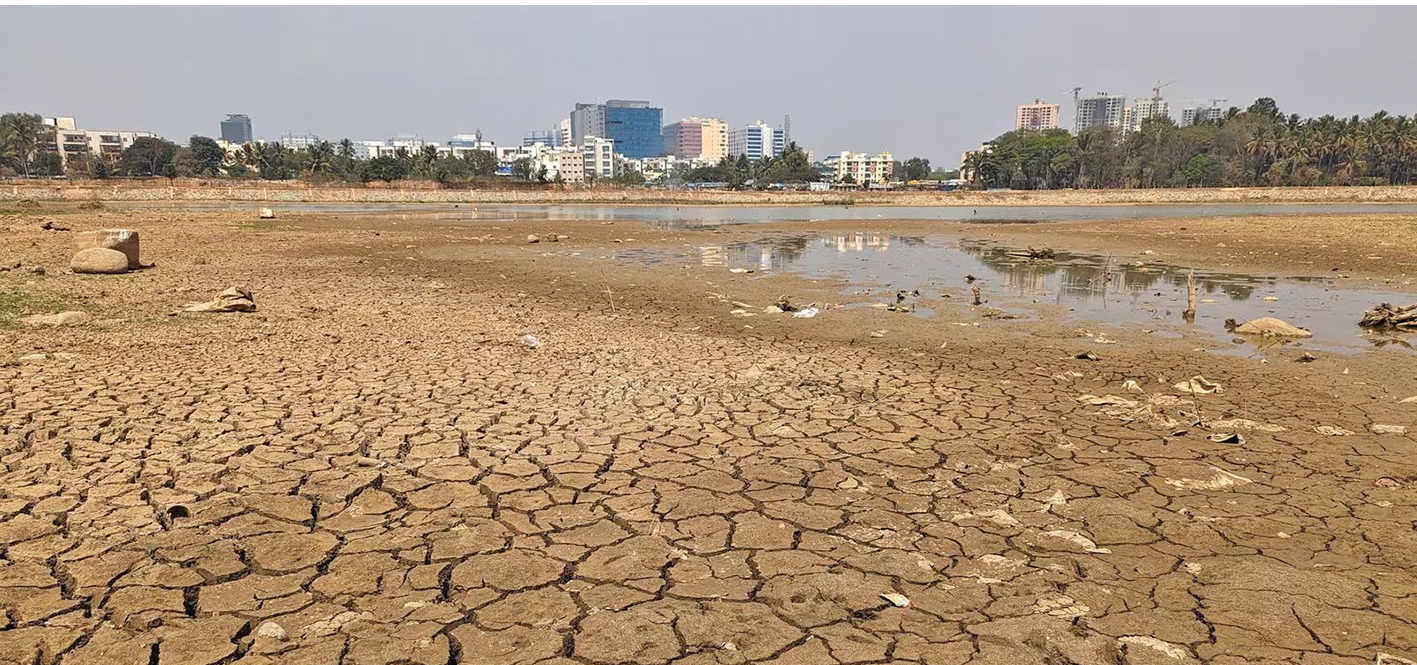
Tackle B'luru's severe water crisis in 2025, govt tasked
Bengaluru: 2024 marked a turning point for Bengaluru, as the city grappled with an intense water crisis that intensified throughout the year. As India's tech hub, Bengaluru faced an alarming water shortage, starting in March, with a daily deficit of 500 million litres roughly 132 million gallons almost 20 per cent of the total demand. This crisis was the culmination of years of unsustainable water management, urban growth, and environmental neglect. Decades of unchecked groundwater extraction for both domestic and industrial use led to the depletion of aquifers, leaving many borewells dry.
A report by the Jal Shakti Ministry revealed that Bengaluru’s groundwater extraction rate had reached a staggering 150.84 per cent, significantly higher than Delhi’s critical rate of 99.13 per cent. Yelahanka, in particular, emerged as the most stressed region, with extraction rates exceeding 225 per cent, while other areas reported over 200 per cent. The overall extraction rate for Bengaluru city stood at 217.4 per cent, highlighting the severe overuse of resources. Rapid urban growth compounded the problem, placing increasing demand on the city's water supply while simultaneously degrading natural water sources like lakes and wetlands. By April and May, Bengaluru's water supply reached a critical low, receiving only 1,850 million litres per day—half of what was required. Furthermore, 50 per cent of the city’s borewells had run dry, making the situation even more dire. The cost of private water tankers surged by Rs 500 to 1000, further straining the financial burden on residents. As the city endured its driest September in decades, concerns over the water supply grew. Dwindling reservoirs, coupled with rising demand, left experts warning of a looming water crisis.
To address this, the Jal Shakti Minister emphasised the need for innovative solutions, such as desalination and advanced groundwater recharge technologies, but acknowledged that these measures were difficult to implement due to infrastructure limitations and feasibility concerns. Shashank Palur, Senior Hydrologist at WELL Labs, noted that Bengaluru's water crisis was largely due to rapid urbanisation and the delayed implementation of the Stage 5 Cauvery water plan. The city’s population had doubled in the past seven years, but water infrastructure had not kept pace with the growing demand.
Palur also pointed to unsustainable consumption patterns, with many Bengaluru residents using over 250 litres of water per day, far exceeding the recommended 150 litres. Long showers, bathtubs and other indulgent habits were contributing factors. He suggested that a shift in consumption patterns was urgently needed to avert further depletion of resources. To tackle the crisis, Palur proposed adopting water management models similar to Singapore’s, focusing on recycling wastewater through Sewage Treatment Plants (STPs). He argued that treating just 50 per cent of Bengaluru's wastewater could significantly alleviate the pressure on the city’s water supply, providing enough recycled water for urban needs like gardening, cleaning, and flushing.
However, the stigma surrounding recycled water remains a barrier to progress. Most of Bengaluru relies on private water tankers, contributing to the so-called "water tanker mafia," a parallel economy that thrives while residents suffer. Despite the ongoing crisis, Bengaluru continues to face significant challenges in sustainable water management. Groundwater, which constitutes nearly 99 per cent of the planet’s liquid freshwater, is a critical resource, but the city’s over-extraction highlights the urgent need for a shift in water management practices.
Preeti Gehlot, Special Commissioner of Forest, Environment, and Climate Change, pointed out that irregular rainfall and extreme weather events, such as heavy rain and drought, were further stressing the city's water supply. As Bengaluru moves into 2025, proactive measures for sustainable water use, better urban planning, and a shift in consumption habits are more critical than ever. If the city does not act soon, its growing dependence on water tankers could deepen its water woes for years to come.
 English daily published in Bengaluru & Doha
English daily published in Bengaluru & Doha






